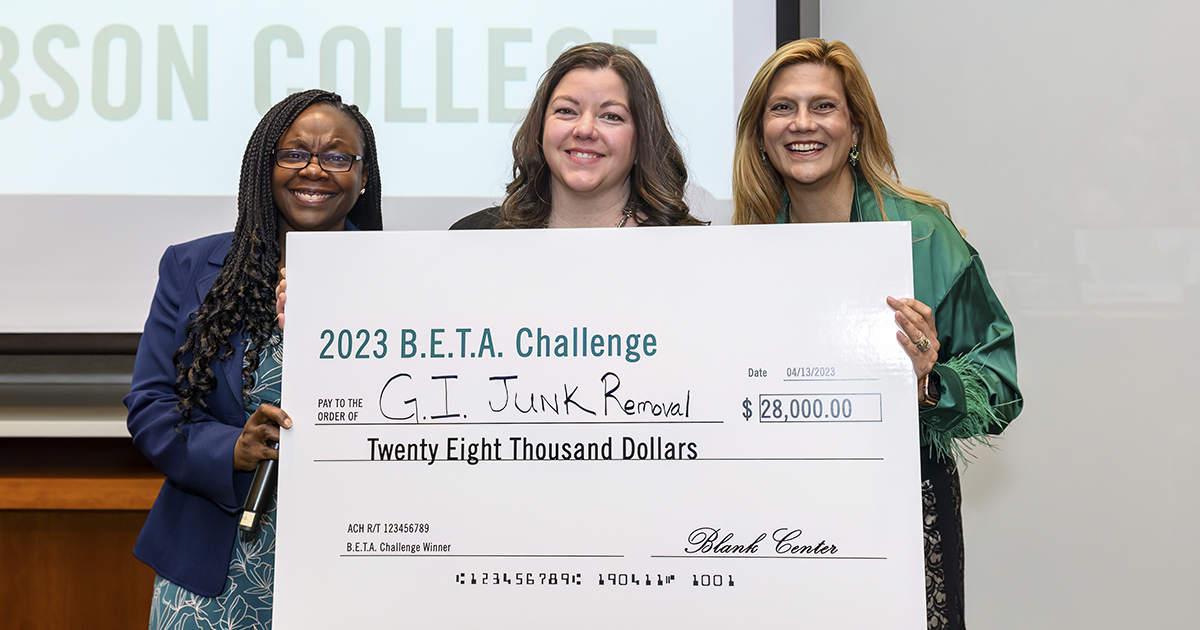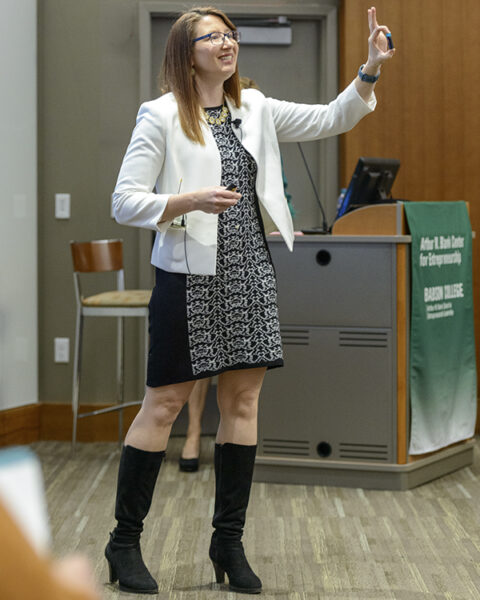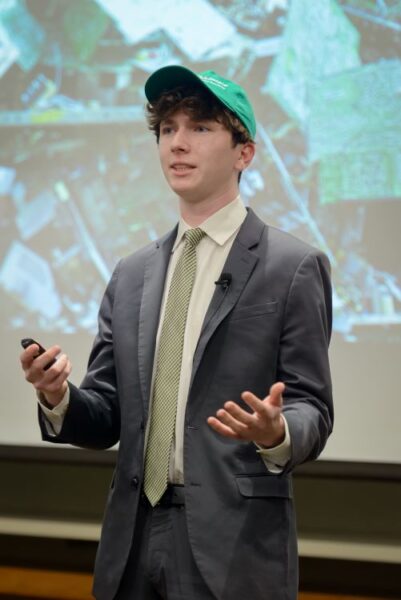Earth-Friendly Ventures Win B.E.T.A. Challenge Grand Prizes

Reduce, reuse, and recycle—that was the earth-friendly focus featured throughout all three of the winning ventures of Babson College’s prestigious B.E.T.A. (Babson Entrepreneurial Thought & Action®) Challenge of 2023.
Amelia Thomas MBA’22 of River Otter Renewables Inc. (alumni track) detailed a process that turns nearly any waste—plastic, plant, or sewage—into usable biocrude oil. Jennifer Calhoun MBA’23 of G.I. Junk Removal (graduate track) removes and restores unwanted junk while providing veterans with work and comradery. And, Dylan Zajac ’25 of Computers 4 People (undergraduate track) refurbishes old computers, keeping them out of landfills and into the hands of individuals and organizations in under-resourced communities.
Smaiyra Million P’21, executive director of the Arthur M. Blank Center for Entrepreneurship, set the stage for the competitive finale April 13 at Joseph L. Winn Auditorium in Olin Hall.
“I’m thrilled to see such a full house,” Million said to an audience packed with students, start-up supporters, faculty, and finalists.
“This is the 12th year of the competition, and we were truly, incredibly impressed with the number of applications,” Million said, adding that judges reviewed 75 proposals. “Most importantly, we were blown away by the caliber of the ventures that are competing. This year’s finalists truly embody Entrepreneurial Thought and Action.”
The three winning ventures each received $28,000 in cash, as well as in-kind services donated by sponsors. The runners-up in the alumni and graduate track received $2,500, while the runners-up in the undergraduate track won $3,000 each, thanks to an additional donation by Sharon Sinnott in honor of Sydel Sokuvitz, the founder of Babson College’s Speech Center.
All nine finalists who took part in the rigorous finale—which features Babson’s best and brightest pitching their ventures to three judges within a tight, five-minute timeline—impressed Donna Levin, CEO of the Arthur M. Blank School for Entrepreneurial Leadership.
“I was just so blown away by all of you,” Levin told the finalists before announcing the winners.
River Otter Renewables Inc.
The alumni winner, Thomas, kicked off her presentation about River Otter Renewables by holding up a small glass container filled with a thick black liquid.

Amelia Thomas, winner of the alumni track B.E.T.A. Challenge, holds up a vial of biocrude oil made out of waste at her company River Otter Renewables.
“This is part of our first batch of crude oil at River Otter Renewables. Our technology works,” Thomas said. She and co-founder Michael Timko created a process that not only reduces waste but also turns that waste into renewable fuels and cleaner water.
“I am shocked and thrilled,” Thomas said of her win. “The Babson B.E.T.A. Challenge is a remarkable competition and has given me a new world of opportunity.”
Thomas plans to use the $28,000 toward further testing the company’s patented process outside of the lab, and most importantly, purchasing a $35,000 reactor system that is key for the process.
The other alumni finalists were Carl Perez ’15 and his venture, Exodys Energy, which aims to turn nuclear waste into energy, and Spoten, a platform created by Ivan Sene MBA’21 meant to connect sports fans with their home team by offering loyalty discounts and other potential encounters.
Alumni judges were Mike LaRhette, chief business officer at LabCentral; HeatherJean MacNeil, PhD, former global director and co-founder of Babson’s Women Innovating Now Lab; and Christian Magel, co-founder and managing partner at Venture Lane Studio.
G.I. Junk Removal
The graduate student winner, Calhoun, co-founded G.I. Junk Removal in 2018 with her husband, Michael, a retired U.S. Army lieutenant colonel who wanted to help retired veterans find purpose and a community after leaving the military.
“G.I. Junk Removal was founded with a vision of veterans serving their community, and community serving veterans,” said Calhoun, who is in Babson’s one-year MBA program.
Calhoun said they noticed much of the junk they removed was usable, so the company began to restore and resell items as well. The company grew so quickly that it struggled to meet its rapidly increasing demands. The winning funds will help Calhoun purchase a $15,000 customer communication platform, hire new staff, and bring in an intern from Babson’s Master of Science in Business Analytics program.
“We were blown away by the caliber of the ventures that are competing. This year’s finalists truly embody Entrepreneurial Thought and Action.”
Smaiyra Million P’21, executive director of the Arthur M. Blank Center for Entrepreneurship
The other graduate finalists were David Ostrovsky MBA’23 of Prediktia, an AI-powered merchandising program for fashion companies; and Lakshya Daga MBA’23 of TruLeague, a platform that helps colleges and universities connect prospective students with student ambassadors.
Graduate judges were Shawn Harris MBA’03, consulting chief technology officer at Dell Technologies; Kerty Levy, managing director at Techstars; and Jennifer Neundorfer, co-founder and managing partner of January Ventures.
Computers 4 People
The undergraduate student winner, Zajac, started Computers 4 People when he was in high school. He pitched his nonprofit organization as a way to restore old computers and donate them to individuals or organizations that need them, while keeping toxic computer parts out of landfills.

Undergraduate track winner Dylan Zajac ’25 pitches his non-profit, Computers 4 People.
“We’ve impacted thousands, helping them to get jobs or access education,” Zajac said. “All while reducing 16,000 pounds of toxic e-waste.”
The winning funds will help increase Zajac’s outreach for additional computer donors and help to speed up the refurbishing process.
“It was surreal to hear Computers 4 People named as the undergraduate B.E.T.A. Challenge winner,” Zajac said. “This was a testament to my hard work and the organization’s potential to grow.”
The other undergraduate finalists were Anastacia Yefimenko ’25, who created Elcove, a line of zero-waste home care products that are sustainable and free of toxic chemicals; and Curtis Johnson ’23 of Wall Street Connection, a nonprofit meant to provide career opportunities in financial services for overlooked Black youths through tailored mentorships.
The undergraduate judges were Cheryl Kiser, executive director of Babson’s Institute for Social Innovation; Craig Dubitsky, the founder of Hello Products and a Babson entrepreneur in residence; and Uli Becker, a Babson WIN Lab expert in residence and the former President and Chief Executive Officer of Reebok International.
Special Awards
The Blank Center also announced three other awards handed out to honor the hard work and value creation of the contestants:
- Calhoun also received the $7,500 High Impact Female Founder Award, sponsored by David Ragins ’94.
- Aleksandr Malashchenko MBA’24—a graduate track semifinalist who submitted LOYKO, a clothing line meant for mature women—won the $15,000 Lila W. Sahney Endowed Fashion and Textile Innovation Award, sponsored by Gobind Sahney ’83 and Sabrina L. Sahney.
- Anh Thu Le ’24, an undergraduate track semifinalist, won the Tech Innovation Award for Sebela, an app that lets customers test makeup looks with AR filters. The $5,000 award was sponsored by Gautam Gupta ’07.
The B.E.T.A. Challenge is created, organized, and produced by the Blank Center team, with special accolades to Alexandra Dunk MBA’22 and Sue Nealon for logistics and execution of the entire production.
Posted in Community




